|
|
|
Sort Order |
|
|
|
Items / Page
|
|
|
|
|
|
|
| Srl | Item |
| 1 |
ID:
190958


|
|
|
|
|
| Summary/Abstract |
This article foregrounds the postcolonial museum as a new source, and site, from which to write South Asian histories of partition and its aftermath. It focuses on collecting practices in India within East Punjab, following the partition of the British-era Punjab province in 1947 between India and Pakistan. Tapping hitherto-unused archival sources, it reveals the considerable financial investment and drive to collect at this time, belying the idea of museums being ‘dead’ colonial assets, and demonstrates their centrality to how citizenship and belonging were articulated (or withheld) in independent India. Some discoveries have far-reaching implications for both historians and museum professionals. The article also shines a light upon a new range of actors—both named and nameless, professional and citizen—who have been marginal to historical enquiry thus far. Moving beyond the familiar colonial templates within which museums in the region have until now been studied, it asks critical questions of the postcolonial museum in South Asia by interrogating the relationship between collections, and the Indian nation-state and its subsidiaries.
|
|
|
|
|
|
|
|
|
|
|
|
|
|
|
|
| 2 |
ID:
187439
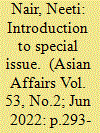

|
|
|
|
|
| Summary/Abstract |
On 9 December 2019, the Lok Sabha, the lower house of India’s parliament, passed a Citizenship Amendment Bill that makes it easier for religious minorities – enumerated as Hindus, Sikhs, Christians, Parsis, Jains and Buddhists – in the three neighbouring states of Pakistan, Bangladesh, and Afghanistan to acquire Indian citizenship. The frequent recourse to particular interpretations of historical events – of the Partition, the war of 1971, and the recent abrogation of article 370 in Kashmir – during the daylong parliamentary debate made it clear that these interpretations of the past have influenced the making of policies that aim to affect the future of religious minorities across South Asia.
|
|
|
|
|
|
|
|
|
|
|
|
|
|
|
|
| 3 |
ID:
187442


|
|
|
|
|
| Summary/Abstract |
Scholars have paid significant attention to the linguistic reorganisation of states in India but there is less consideration of how the demands of linguistic movements to redraw the map of India is linked to the history of partition across the colonial-postcolonial divide as well as of the new minorities that linguistic states created. This article draws attention at first to the unsuccessful pre-partition resistance of Sindhi Hindus to the separation of Sindh from the Bombay Presidency on linguistic lines as separation would make them a religious minority. The article then discusses Sindhi resettlement in India as deterritorialised partition refugees, when they had to claim belonging in the context of reinvigorated calls for the redistribution of boundaries based on linguistic majorities. As an alternative to territorial representation, Sindhi refugees successfully sought inclusion in the Eighth Schedule of the Constitution of India, a list of officially supported languages meant originally to enrich Hindi. This history reveals how partition and partition's refugees reshaped constitutional conceptions of minority citizenship in a manner not yet acknowledged. The inclusion of Sindhi in the Eighth Schedule transformed the Schedule's primary purpose from that of augmenting Hindi to additionally conferring protections to a group of minority languages. The Sindhi demand for inclusion paved the way for other minorities whose linguistic identity did not necessarily map neatly on to a geographically defined state to claim recognition in the Schedule. This opened a new but limited option for constitutional safeguards for linguistic minorities without a linguistic state in India.
|
|
|
|
|
|
|
|
|
|
|
|
|
|
|
|
| 4 |
ID:
139886
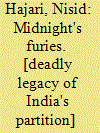

|
|
|
|
|
| Publication |
Gurgaon, Penguin Books India Pvt Ltd, 2015.
|
| Description |
xx, 328p.Hbk
|
| Standard Number |
9780670088218
|
|
|
|
|
|
|
|
|
|
|
|
Copies: C:1/I:0,R:0,Q:0
Circulation
| Accession# | Call# | Current Location | Status | Policy | Location |
| 058252 | 954/HAJ 058252 | Main | On Shelf | General | |
|
|
|
|
| 5 |
ID:
130010
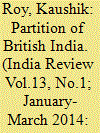

|
|
|
|
|
| Publication |
2014.
|
| Summary/Abstract |
The Partition of the British Indian Empire in the summer of 1947 was a watershed in British-Imperial as well as South Asian history. From the imperial perspective, the British Empire lost much of its luster after the loss of its jewel in the crown. From the perspectives of the inhabitants of the Indian subcontinent, several millions died in the ensuing Partition riots and the mass migrations following the division of British India into two new sovereign countries: India and Pakistan. Today American, British, Indian, Pakistani, and to a lesser extent Bangladeshi scholars continue to debate various aspects of the Partition of India.
|
|
|
|
|
|
|
|
|
|
|
|
|
|
|
|
| 6 |
ID:
134573
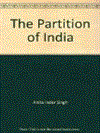

|
|
|
|
|
| Publication |
New Delhi, National Book Trust, 2013.
|
| Description |
91p.Pbk
|
| Standard Number |
9788123746968
|
|
|
|
|
|
|
|
|
|
|
|
Copies: C:1/I:0,R:0,Q:0
Circulation
| Accession# | Call# | Current Location | Status | Policy | Location |
| 057948 | 954/SIN 057948 | Main | On Shelf | General | |
|
|
|
|
| 7 |
ID:
172227
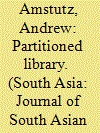

|
|
|
|
|
| Summary/Abstract |
This article argues that the history of a damaged Urdu library in Delhi reveals new perspectives on the ways in which prominent Indian Muslim scholars dealt with the violent displacements of the 1947 Partition of British India and imagined new futures for the Urdu language across the borders of India and Pakistan. The library of the Anjuman-e Taraqqi-e Urdu (Association for the Advancement of Urdu), an influential Urdu literary association, was damaged during the violence following Partition in August 1947. In contrast to the relative absence of official commemorations of Partition in post-colonial South Asia, the Anjuman’s leaders documented and publicised the violence of Partition on their library. Moreover, these Urdu scholars used the material process of restoring the damaged library in 1947 and 1948 to rethink the role of the library as a repository to preserve evidence of the continuing production of Urdu knowledge in India. In turn, the disputed division of the library in 1949 illuminates competing visions for Urdu’s future in India, Pakistan, and beyond. This story of one Urdu library demonstrates how changing library collecting priorities and material practices shaped broader debates over Urdu’s place in twentieth-century South Asia.
|
|
|
|
|
|
|
|
|
|
|
|
|
|
|
|
| 8 |
ID:
031386
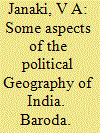

|
|
|
|
|
| Publication |
Baroda, Maharaja Sayajirao University of Baroda Press, 1977.
|
| Description |
265p.Hbk
|
| Series |
Maharaja Sayajirao University of Baroda Geography Series No.8
|
|
|
|
|
|
|
|
|
|
|
|
Copies: C:1/I:0,R:0,Q:0
Circulation
| Accession# | Call# | Current Location | Status | Policy | Location |
| 028400 | 910.132054/JAN 028400 | Main | On Shelf | General | |
|
|
|
|
| 9 |
ID:
163822
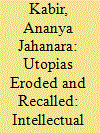

|
|
|
|
|
| Summary/Abstract |
The short-lived geopolitical entity, East Pakistan (1947–71), left a deep impact on its successor state, Bangladesh, through the networks of intellectual kinship it enabled for its young elites who subsequently became Bangladesh’s nation-builders. Drawing on memory studies and literary critical reading methods, I examine the testimonies of nine such elites interviewed by the ‘Bengali Intellectuals Oral History Project’ (BIOHP), alongside their writings published before and after the creation of Bangladesh. This first sustained account of East Pakistan’s intellectual legacy thus also illustrates how a post-colonial intellectual history may be extracted from oral histories as the private and inchoate domain of memory.
|
|
|
|
|
|
|
|
|
|
|
|
|
|
|
|
|
|
|
|
|